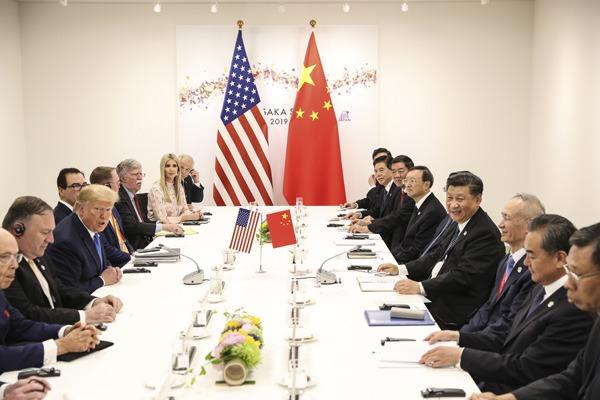Media Report

- The Wall Street Journal reports, "President Trump and President Xi Jinping of China managed to get trade talks back on track this past weekend, but an even tougher job lies ahead—appeasing hard-line factions within their own governments demanding they give no quarter. Mr. Xi faces party leaders and executives of state-owned enterprises who believe Washington is out to demolish the government-led economic model that is responsible for China's emergence as a global power and U.S. rival. Mr. Trump, for his part, faces skepticism from some Republican and Democratic lawmakers who worry he will give up too much in any deal, as well as wariness among some of his own appointees. Heading into an election year, Mr. Trump must also contend with restiveness among his supporters in the business community and farm-belt states who have been hit by the tariffs imposed by both countries."
- The New York Times reports, "In an impromptu question-and-answer session late last month at the White House, President Trump was asked about the nation's efforts to block Huawei, the Chinese telecommunications company, from doing business in the United States and with our allies around the globe. 'Huawei is something that is very dangerous,' Mr. Trump said. Then, almost in the same breath, he added: 'It's possible that Huawei would be included in a trade deal. If we made a deal, I can imagine Huawei being included in some form or some part of a trade deal.' Over the weekend in Japan, Mr. Trump appeared to choose trade over national security, suspending the ban on United States companies' supplying equipment to Huawei as he hopes to reach a trade deal with President Xi Jinping of China. Without providing any details, he declared that American companies could sell to Huawei without creating a 'great, national emergency problem.'"
- The Wall Street Journal reports, "Protesters smashed through glass walls and stormed Hong Kong's government headquarters on the anniversary of the city's return to Chinese sovereignty, diverging from a movement that had until now largely stuck to nonviolent means. The mayhem at the building that houses the city's legislature stood in stark contrast to the scene nearby, where organizers estimate 550,000 people marched through the streets in scorching summer heat, with few security-related incidents apart from several cases of heat stroke. As mostly young activists broke windows and defaced the legislative chamber, they described their rampage as a last-ditch effort to force the government to accede in a standoff over the city's future. The unrest was spawned a month earlier when Hong Kong Chief Executive Carrie Lam sought to pass legislation—since put on hold—allowing suspects to be extradited to China, which has a far more opaque legal system."
Calendar
- 2019-06-28 As Trump and Xi Talk Trade, Huawei Will Loom Large
- 2019-06-27 Huawei Hits Back at Claims It Steals Secrets
- 2019-06-26 ‘My Plan B Is Maybe My Plan A’: Trump Threatens New Tariffs on China
- 2019-06-25 Global Telecom Carriers Attacked by Suspected Chinese Hackers
- 2019-06-24 U.S., China Discuss Xi-Trump Summit as Trade Fights Simmer
- 2019-06-23 US Considers Requiring 5G Equipment for Domestic Use Be Made Outside China
- 2019-06-21 Hong Kong protesters surround police headquarters, demand extradition bill be truly scrapped
- 2019-06-20 Xi Jinping Arrives in North Korea, With Many Eyes on Trump
- 2019-06-19 Senior U.S.-Chinese trade negotiators to confer before Trump-Xi G20 meeting
- 2019-06-18 Trump says U.S., Chinese teams to restart trade talks ahead of G20
News
- The Wall Street Journal U.S.-China Trade Talks Are Back On but Obstacles Remain
- The New York Times What Trump's Huawei Reversal Means for the Future of 5G
- The Wall Street Journal Hong Kong Protesters Break Into Government Headquarters
- Reuters Taiwan president to visit U.S. this month, angering China
- Bloomberg China Plans to Tighten Rules on $2 Trillion Corner of Market
- CNBC Private survey of China's factory activity in June shows lowest reading since January
- Reuters China tells Britain to stop 'gesticulating' about Hong Kong
- Bloomberg Apple May Gain $20-$25 on China Tariff Resolution, Wedbush Says
- Reuters U.S.-China trade agreement takes little pressure off Fed to cut rates
- CNBC Trump's decision to let Huawei buy US products is 'not a general amnesty,' Kudlow says
- Reuters China's AIIB eyes $10-12 billion a year in project financing, steady growth
- Bloomberg China to Ease Ownership Rules on Oil Exploration, City Gas
Commentary
- Forbes After G20, Another Trade War Déjà Vu
- The Wall Street Journal My Customers Don't Pay Trump's Tariffs
- CNN At the G20, those who yelled the loudest were heard
- CNBC Trump is laying groundwork for a new world order built around the US, China and Russia
- Bloomberg Trump Made Huawei a Political Pawn
- Foreign Affairs Hong Kong's Muzzled Generation Cries Out